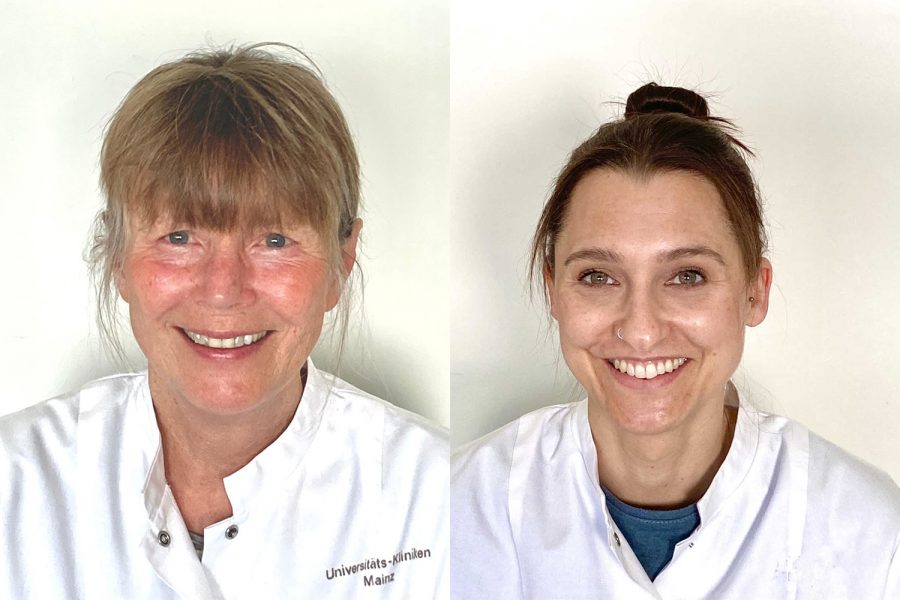
Order a paternity test online
Do you have questions about the paternity test? We will be happy to help you with the answer: ☎ 06131-720620
Do you need a paternity test for the Youth Welfare Office or the Immigration Office?
The DNA test is to be used for possible inheritance matters?
Our laboratory has been working for numerous family courts and authorities for almost 20 years. All of the DNA tests we offer can be used in court or by the authorities. There is no difference between the laboratory test and a court-ordered expert opinion.
We can also send the collection kit directly to the youth welfare office / authority / lawyer. If the test persons do not live in the same place or do not go to the sample collection together, we are also happy to send the documents to separate addresses.
Request a free DNA test kit for proof of paternity
Request our test set now, free of charge and without obligation. Payment is made simply and conveniently by bank transfer or Paypal once the samples have been returned.

PROCEDURE OF THE PATERNITY TEST

1. you order the collection kit by telephone or online; you can also make an appointment for collection directly in the laboratory. We would therefore ask you to contact us by telephone.
The collection kit contains sachets with 2 DNA-free cotton swabs each.

2. take the SEALED blue envelope (collection kit) to a neutral witness (e.g. a doctor) who will take the sample. The test kit comes with a card indicating who is a potential witness. We would also be happy to advise you on this. For a DNA report for official purposes, we recommend having the sample taken by a doctor or by our laboratory.

3 . please bring your ID and, in the case of underage children, the birth certificate or a copy of it with you to the collection. This data is entered by the witness on the form for proof of identity and copies of ID and, if applicable, the birth certificate are attached.

4 . the declaration of consent is signed by all adult test subjects; in the case of underage children, the signature of all legal guardians is required.

5. the samples are taken in the form of an oral swab.

6. the return to our laboratory is made BY THE DECISION-MAKING PERSON, e.g. by the doctor, the pharmacy or an authority.
FURTHER IMPORTANT INFORMATION

Checklist for shipment to the laboratory, please return the following to us:
– Copy of the father’s identity card
– Declaration of consent by the father
– Copy of the mother’s identity card
– Declaration of consent by the mother
– Copy of the child’s birth certificate
– Proof of identity
– Order form
– Samples
Declaration of consent by the test subjects
– Regardless of whether it is a private report or a report for an authority, the consent of all test subjects is required for the test to be carried out.
– In the case of minors, all legal guardians must give their consent.
– If you have sole custody, please enclose a certificate of sole custody. You can usually obtain this negative certificate free of charge from your local youth welfare office.


Why should the mother also be tested?
– So that the potential father can be sure that the right child is being tested
– This excludes close relatives (e.g. the child’s uncle) as potential fathers, which is particularly important in the case of immigration and family reunification.
– Always in official cases for the youth welfare office or court, so that there is no doubt about the identity of the child.
– Always in infants, as breast milk residues can lead to mixed profiles from mother and child.
Frequently asked questions about the paternity test
Paternity is either confirmed with at least 99.9% (“paternity practically proven”) or clearly excluded.
Involving the child’s mother in the test increases the certainty of the result, as the identity of the child is clearly confirmed.
Our appraisals are carried out in accordance with current technical standards and legal requirements.
The laboratory is accredited to DIN EN ISO/IEC 17025 in accordance with the German Genetic Diagnostics Act and is therefore regularly inspected.
If we see during an analysis that the saliva sample is contaminated or does not carry enough DNA material, we will either use the second saliva sample or contact you again and ask for a new sample.
Children inherit half of their genetic traits from their father and the other half from their mother.
The characteristics examined for a paternity test are sections of DNA that differ greatly between unrelated persons.
If the examined man possesses the trait inherited from the father in all systems examined, he cannot be excluded from paternity, i.e. he can be considered as the father. The probability of his paternity is then calculated. If this is at least 99.9%, paternity is considered practically proven.
If the tested man does not have the trait inherited from the father in 4 or more of the tested systems, he can be excluded from paternity.
At least 18 characteristic systems (so-called STR systems) are examined in our laboratory. If necessary, this scope can be expanded to include additional feature systems.
In the first step, samples are taken from the persons tested. This must not be done by the test persons themselves, but you need an appropriate body such as our laboratory, a doctor or other suitable institution such as a midwife or a pharmacy.
You are welcome to make an appointment in our laboratory. Just give us a call. All you need to bring to the appointment is your ID, or the birth certificate in the case of underage children. We do everything else on site. Payment can either be made in cash or we can provide you with a bank transfer form.
Alternatively, we will send you a complete sampling kit with all the necessary documentation.
In the outer envelope you will find a general information letter and an order form. Fill it out completely, sign it and take it together with the sealed inner envelope, as well as identification documents, or birth certificate in the case of underage children, to the office that will take the sample for you.
All forms are then filled out and signed there, and the swabs are taken. The samples are returned by the sampling center, not by you.
As soon as the samples of all test persons have arrived in our laboratory and payment for the test has been received, we start the analysis.
We will send the result to the addresses specified in the order form.
Please note that all persons involved in the test are entitled to request a copy of the result from us.
As soon as the samples of all test persons are in our laboratory and the test has been paid for, we start the analysis. This takes about 7-10 days. You are welcome to inquire about the processing status by phone, WhatsApp or e-mail, stating your order number.
The samples may not be taken by the test persons themselves or by friends, family or other private individuals. You will need an appropriate office such as our laboratory, a doctor or other suitable institution such as a midwife or pharmacy. Some youth welfare offices or charitable institutions also take these samples. Our laboratory has included a card with the sample collection kit that names possible “sample takers”. Please note: These are recognized by our laboratory. If you need the test for an authority, such as a court, a foreigners’ registration office or an embassy, we recommend that you clarify in advance whether the corresponding sample collection point is also accepted. As a rule, we recommend consulting a doctor or our laboratory in these cases.
The expert opinion will be sent to the person(s) specified as the recipient(s) in the order form.
All test subjects are entitled to request a copy of the results. Pursuant to §1598a para. 4 BGB, all test persons have a right to information from the client.
In addition, we are also happy to send a copy of expert reports required for official purposes to the relevant authorities at your request. Simply indicate this in your order form.
Our laboratory offers two options for privately commissioned paternity tests.
The simple expert opinion for private purposes and the more extensive expert opinion for courts and authorities.
It is important to know that the technical implementation is the same for both variants. The only difference is the scope of the result sent. In both cases, you will receive a meaningful expert opinion.
We also recommend involving the mother in the simpler test variant. The price difference is small, but the informative value is greatly increased. It is also possible to expand the expert opinion at a later date to create a version that is suitable for use in court and by the authorities. This also includes the sending of the proof of identity completed during the sample collection.
In principle, the test can also be carried out without the mother, but it is not recommended. According to the current guidelines for carrying out parentage assessments, the mother should only be excluded in exceptional cases, for example if she lives separately from the child to be tested, is deceased or if the child has already reached the age of majority.
Without the analysis of the mother, the report must state that the identity of the child could not be confirmed by comparison with the mother. In addition, the inclusion of the mother increases the significance of the test result and can lead to the probability value determined being increased or more exclusions becoming apparent.
If you decide that the child’s mother does not provide a sample, she must always give her consent if she has custody of the minor child and be present when the sample is taken.
Definitely: No! Secret parentage tests are prohibited by the Genetic Diagnostics Act. The consent of all test subjects must be obtained for the test to be carried out, or the consent of all legal guardians for underage children.
Documented sampling ensures that it is clear that the right people are actually being tested. This should prevent manipulation and give you a reliable result.
Samples can be taken directly after birth. Since DNA can be extracted from oral mucosa cells, it is not necessary to take a blood sample.
No, so-called prenatal paternity tests are prohibited in Germany. There is an exception in the case of pregnancy as a result of a criminal offense (e.g. rape). However, this must be reported to the police.
That is not a problem at all. Each test receives an individual process number from us. If we send the sample collection kits to different addresses, all forms and cotton swabs will be labeled with this number. This means they can be assigned to the correct case, even if they come back to our laboratory at different times and from different addresses.
Sampling kits can also be sent abroad. In line with sample collection in Germany, documented sample collection can also be carried out by a doctor there. All necessary documents are also available in English. Please note that courier costs may be incurred for sending the documents.
As the sample collection sticks dry after collection, it is no problem at all if they are out for a longer period of time.
Yes, the expert opinion can also be submitted to the authorities by means of identity verification when the sample is taken. Please note, however, that the simple version of the expert opinion may not be recognized if the mother was not included in the analysis.
For these cases, we recommend our DNA test for authorities & courts
No, the samples may not be taken by the test persons themselves or other private individuals. You will need a suitable location for this, such as our laboratory, a doctor or other suitable institution such as a midwife or pharmacy. Some youth welfare offices or charitable institutions also take these samples.
The current regulations make manipulation very difficult. The material for sample collection is sent in a sealed envelope that is only opened by the sample collection point. The identity of the persons tested is documented there. The samples are also only returned by the sample collection point and not by the test persons themselves.
The methods used today can also be used to investigate more complex family relationships, such as between uncle and nephew, grandmother and grandson or siblings.
It is always important that we discuss your case in detail in advance. We clarify which people should be included in the analysis and what the chances are of obtaining a meaningful result. Simply give us a call with no obligation.
If the person has only recently died, it may be possible for a sample to be taken, for example by the funeral home. Test materials such as blood samples may also be available. In these cases, we require a copy of the death certificate and the consent of the person(s) entitled to death.
Alternatively, relatives of the deceased person (other children, parents, siblings) can also be examined if they are available.
To discuss your case individually, simply give us a call and we will clarify what the best course of action is.
Yes, our laboratory has many years of experience in carrying out DNA tests for family reunification. We work together with the agencies involved (embassies, consulates, IOM) to organize the collection of samples abroad.
You will find a summary of the most important information in the form of a checklist on our homepage or we will be happy to send it to you.

Do you have any further questions?
Can’t find an answer to your question? No problem!
We will be happy to help you personally with your question. Please use the following button to access our contact form. Here you will find information on the various contact options. We look forward to seeing you!
Dr. Ulrike Schacker & Ms. Cora Schneider.
